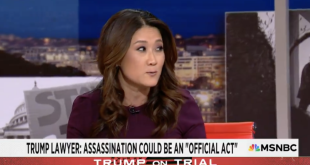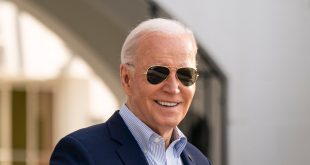President Biden cemented a new strategic relationship with Vietnam on Sunday, bringing two historical foes closer than they have ever been and putting the ghosts of the past behind them out of shared worry over China’s mounting ambitions in the region.
During a landmark visit to Hanoi by the American president, Vietnam’s Communist Party leadership formally raised the country’s ties to the United States to the highest level in Hanoi’s diplomatic hierarchy, equivalent to those it has with Russia and China. Mr. Biden said the breakthrough was “the beginning of even a greater era of cooperation” a half-century after American troops withdrew.
“Today, we can trace a 50-year arc of progress in the relationship between our nations, from conflict to normalization,” Mr. Biden said at a news conference after a meeting with Nguyen Phu Trong, the general secretary of the Communist Party of Vietnam. “This is a new elevated status that will be a force for prosperity and security in one of the most consequential regions in the world.”
While neither he nor Mr. Trong directly cited China in their public remarks, it was an important subtext for the move as Mr. Biden works to establish a network of partnerships in the region to counter aggressive action by Beijing. In recent months, he has expanded cooperation with Australia, India and the Philippines and brought the leaders of Japan and South Korea together at Camp David to seal a three-way alliance that has eluded Washington in the past.
“The United States is a Pacific nation, and we’re not going anywhere,” Mr. Biden said on Sunday, a statement that appeared intended to put China on notice.
But in response to reporters’ questions, Mr. Biden denied any hostile intent, rejecting a new Cold War in the Indo-Pacific region. “I don’t want to contain China,” he said. “I just want to make sure that we have a relationship with China that is on the up and up, squared away, everybody knows what it’s all about.”
Beijing was not persuaded. In the days leading up to Mr. Biden’s visit, Mao Ning, a spokeswoman for China’s Foreign Ministry, called on the United States to “abandon the Cold War mentality and zero-sum game mind-set” in its dealings with Asia, insisting that Washington “abide by the basic norms of international relations.”
Mr. Biden arrived in Hanoi after a weekend in New Delhi attending the annual Group of 20 summit meeting. Notably absent was President Xi Jinping of China, who typically makes a point of attending such gatherings. In his place came Premier Li Qiang, the country’s No. 2 leader.
Mr. Biden disclosed during his news conference in Hanoi that he had spoken with Mr. Li on the sidelines of the summit. “We talked about stability,” he said. “It wasn’t confrontational at all.”
Speculation about Mr. Xi’s absence has been intense within the Biden administration. There are four theories for why he skipped the meeting: He has domestic political pressure over the country’s growing economic troubles. He wanted to send a signal to India amid a tense border dispute. He is seen at home as having spent too much time abroad. Or he wants to shift the focus to groupings more susceptible to Beijing’s direction, like the BRICS club of nations that includes Russia, Brazil and other powers.
Despite Vietnam’s new agreement with Mr. Biden, China remains its dominant foreign partner, given the countries’ longstanding economic ties, and Beijing has signaled it will not cede the ground to the United States. Just last week, Mr. Li met with Prime Minister Pham Minh Chinh of Vietnam on the sidelines of another international summit meeting in Jakarta, Indonesia.
But Vietnam, one of the few Southeast Asian nations to push back against Chinese assertiveness in the South China Sea, is looking to establish a little more distance from Beijing and give itself a little more latitude. Biden administration officials do not expect Vietnam to abandon its cooperation with China entirely, but hope to offer more of an alternative over time.
Likewise, administration officials anticipate that Vietnam will remain close to Russia, its historic patron since the days of the Soviet Union, and expressed no concerns over a New York Times report about Hanoi secretly seeking a new arms deal with Moscow even as it hosted Mr. Biden.
The vast bulk of Vietnam’s military is based on Russian equipment, so it has little choice but to continue purchasing weapons, equipment and parts from Moscow. But Vietnam does appear to have begun gradually weaning itself off its Russian suppliers. The American government could follow up Mr. Biden’s visit with sales of F-16 warplanes and military radar batteries, which are coveted by Hanoi.
“Vietnam and the United States are critical partners at what I would argue is a very critical time,” Mr. Biden told Mr. Trong during their meeting in a conference room with a bust of Ho Chi Minh overlooking the two delegations. “I’m not saying that to be polite. I’m saying it because I mean it from the bottom of my heart.”
Mr. Trong, the aging Communist Party leader, has made the advancement of relations with the United States a priority over the resistance of other party figures, a possible legacy for him as he heads into the twilight of his tenure. The United States and Vietnam established normal diplomatic relations under President Bill Clinton in 1995, and moved them up to comprehensive relations under President Barack Obama in 2013.
Now it will define their ties with Washington to be a “comprehensive strategic relationship,” which it has only with China, Russia, India and South Korea. Standing behind Mr. Biden on Sunday was John F. Kerry, the Vietnam War veteran-turned-protester who as a senator helped usher in normalization in the 1990s and as secretary of state supported the elevation nearly two decades later. He now serves as Mr. Biden’s climate envoy.
In treating Mr. Biden to a pomp-filled welcome, complete with goose-stepping honor guards, marching bands and flag-waving children, Mr. Trong was effusive about their relationship, even flattering the 80-year-old president by saying he did not look old.
“You have nary aged a day, and I would say you look even better than before,” Mr. Trong told Mr. Biden. Mr. Trong added: “Every feature of you, Mr. President, is very much complementary of your image.” Mr. Biden laughed appreciatively.
The Vietnamese leadership, though, is more complicated than one man, more of a collective than in China or Russia. As a result, Mr. Biden plans to make a point of paying separate visits on Tuesday to several other influential figures: Mr. Chinh, the prime minister; President Vo Van Thuong; and Vuong Dinh Hue, the head of parliament.
Human rights activists have accused the U.S. government of casting aside its professed commitment to promoting democracy and human rights abroad in favor of shoring up U.S. influence in the region. Vietnam continues to be one of the most authoritarian countries in Southeast Asia, and Mr. Trong’s government has waged an especially harsh crackdown on dissent and activism in recent years.
“U.S. silence on human rights may be seen as complicity in the Vietnamese government’s ever-expanding crackdown on rights, compromising the long-term relationship,” said Phil Robertson, the deputy Asia director at Human Rights Watch, referring to Mr. Biden’s visit to Hanoi.
The disparity between Mr. Biden and Mr. Trong was evident in their scripted comments after their meeting. While Mr. Trong stressed the importance of “noninterference in each other’s domestic affairs” and respect for each other’s political system, Mr. Biden said he had “raised the importance of respect for human rights.”
The president responded testily when later asked if he was putting American strategic interests over human rights.
“I’ve raised it with every person I met with,” he said.
Sui-Lee Wee contributed reporting.
 Top Naija News: Nigerian News, Breaking News Nigeria and World News Top Naija News is a daily news publication in Nigeria, delivering the latest breaking news in Nigeria and around the world.
Top Naija News: Nigerian News, Breaking News Nigeria and World News Top Naija News is a daily news publication in Nigeria, delivering the latest breaking news in Nigeria and around the world.



